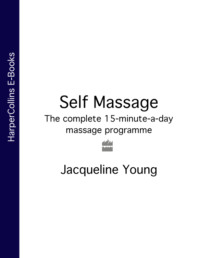Kitap dosya olarak indirilemez ancak uygulamamız üzerinden veya online olarak web sitemizden okunabilir.
Kitabı oku: «Self Massage: The complete 15-minute-a-day massage programme»
Self-Massage
A complete 15-minutes-a-day massage system for health and healing
Jacqueline Young

For Sarah
Table of Contents
Title Page
Dedication
INTRODUCTION
1 Why self-massage?
2 The self-massage system
3 Preparation
4 The sequence
5 The moves
SELF-MASSAGE
1 Warm-up
2 The head and face
3 The neck, shoulders and arms
4 The chest and abdomen
5 The back
6 The legs and feet
FINE POINTS
1 Fine points of practice
2 Adapting your practice
3 Common questions and experiences
4 Breathing exercises
5 Finger and hand exercises
6 Massaging others
APPENDICES: KNOW YOUR BODY
1 The skeletal system
2 The muscular system
3 The vital organs
4 The meridian system
5 Acupoint guide
Footnote
Further reading
Index
Acknowledgements
About the Author
Copyright
About Publisher Page
INTRODUCTION
1 Why self-massage?
2 The self-massage system
3 Preparation
4 The sequence
5 The moves
1 Why self-massage?
The art of massage has been with us since ancient times. It can be used for relaxation and pleasure, or therapeutically in the treatment of aches, pain and injuries.
In the Orient, self-massage techniques have traditionally been handed down in families, and sometimes even taught in schools, for the relief of tension and the promotion of health.
There are many techniques of massage, and some take several years and much practice to master. Yet each have simple movements which can easily be learnt and used to good effect on one’s own body.
By learning how to massage yourself you can:
build up good health and prevent disease
aid relaxation
promote healing of minor ailments and imbalances
increase self-awareness
Anyone can learn self-massage and, with practice, you can vitalize the whole body in a 15 minute top-to-toe routine. Alternatively, just a few minutes can be spent massaging whichever part of the body requires attention: for example, massaging the neck and shoulders to relieve a stiff neck or headache.
With this massage you will have a self-health system literally at your fingertips! It can be used anytime, anywhere, and no special equipment or oils are needed. It is not even necessary to remove clothing as the techniques are designed to be performed through light clothing as easily as on the skin itself.
Once you feel confident of the movements they can easily be adapted for use on others. So, by learning self-massage, friends and family can benefit too!
With self-massage, because you are working on yourself, you can practise whenever you have a free moment rather than having to find someone to practise on. This means that you can quickly build up confidence in your touch and develop mastery of the techniques.
With experience you will learn to detect subtle changes in the body which can be a valuable tool in monitoring your health and determining the body’s needs. Regular practice will ensure relief from tiredness and tension and will leave you feeling vibrant and well.
2 The self-massage system
This simple self-massage system is based on a combination of Japanese and Chinese massage therapies, together with acupressure techniques. The system works not only on releasing muscular tension, but also on stimulating the energetic system of the body, known in acupuncture as the meridian system.
The meridians
According to oriental medical theory, a network of channels covers the entire body and links with each of the internal organs. These channels, or meridians, are located just below the surface of the skin. They are not visible to the naked eye but can be measured electrically. They are said to conduct a current through the body which is termed ‘Qi’ in Chinese and ‘Ki’ in Japanese, and is generally translated as ‘vital energy’. The balanced supply of this vital energy throughout the body is said to be essential for health. There are twelve main meridians; they function in pairs and run on both sides of the body. There are also eight extraordinary meridians, two of which are important in the self-massage system.
The twelve main meridians
Lung – Large Intestine
Stomach – Spleen
Heart – Small Intestine
Urinary Bladder – Kidney
Pericardium – Triple Heater
Gall Bladder – Liver
Two extraordinary meridians
Conception Vessel – Governor Vessel
Most of the meridians correspond to actual physical organs, but others relate to specific functions of the body. The Triple Heater meridian relates to circulation and the distribution of fluids around the body, as well as to the health of the sexual organs. The pericardium is a membrane around the heart and the Pericardium meridian relates to heart and circulatory function in the body. The Conception and Governor Vessel meridians serve to supply and unite the energy within the other twelve meridians.
Ücretsiz ön izlemeyi tamamladınız.
